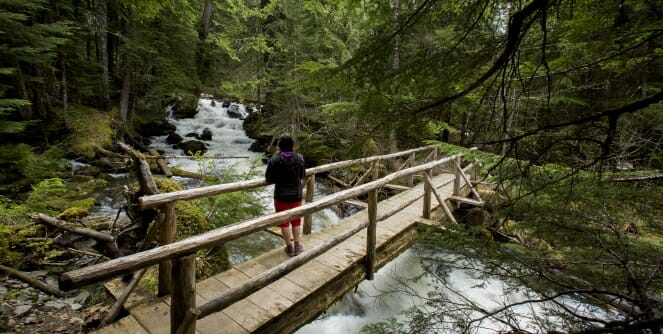Let’s talk about Rush Hour, Business Time, LOTS, After Hours, Section 102 and more. Not the trails specifically, but trail-related topics named after those Whistler lines, such as busyness, commercial and event use, parking lots, trail closures, unauthorized trails and more.
The Resort Municipality of Whistler (RMOW) has launched a multi-year process to develop a Recreation Trails Strategy and wants to hear from you on a range of trail-related topics as part of its first round of engagement.
Feedback from the initial survey will be used to further build out the scope for the Recreation Trails Strategy, which when complete will provide high-level direction related to trail and trail-related amenity development, improvement, access, funding and management.
“I encourage everyone who uses Whistler’s extensive trail network to add their voice to this first-step in developing the Recreation Trails Strategy – whether you use the trails for biking, hiking, running or trials bikes,” said Whistler Mayor Jack Crompton. “More engagement opportunities will also take place at later dates as part of the step-wise process to develop a Recreation Trails Strategy for Whistler that will be comprehensive, long-lasting and effective at meeting the diverse set of needs within our community.”
Topics include:
- Rush Hour: trail busyness
- I’m Not Satisfied: gaps in the trail network
- Business Time: commercial, tenured and event use
- LOTS: trailhead access, parking and facilities
- Pot of Gold: trail costs and funding
- Between the Creeks: Environmental impacts
- Danimal: Wildlife conflicts
- After Hours: trail closures
- Section 102: unauthorized trails
- D-Railment: land use conflicts
- Out There: wayfinding
- 99er: Trail use by trials motorbikes
The survey will take 20-25 minutes to complete and is open until March 31at 11:59 p.m.
Need for a formal trail strategy
Over the last five years, recreation trail use has increased significantly in almost every jurisdiction in the province, and Whistler is no exception. The explosion in trail use is fueled by population growth, transportation and access improvements, e-bike technology and, recently, COVID-19. Surging use brings new and exacerbated challenges, including those related to trailhead parking and amenities, trail overcrowding, trail maintenance, natural areas protection, wildlife conflicts and more.
In the absence of a formal trail master plan, Whistler’s trail network has grown organically over the decades, initially with hiking and motorized trials motorcycle riding, and later mountain biking. The network exists in a range of environments, including valley bottom areas, forests of second and old growth trees, logged areas, and alpine zones.
The trail network also extends across a variety of jurisdictional responsibilities, and while some trails possess formal standing, many others do not. Those that are formally recognized are managed by a variety of organizations overseeing a complex, yet incomplete, ownership and responsibility matrix.
Recreation Trails Strategy to be released Fall 2022
Developing the Recreation Trails Strategy will be done in a step-wise fashion, with the final strategy expected to be complete in the fall of 2022.
As a higher-level strategy, the Recreation Trails Strategy will not specify the number, location or types of trails, which will be the focus for a future and more detailed Trails Master Plan.
Elements likely to be considered through the development of the Recreation Trails Strategy include:
- Trail network inventory, unauthorized trails, gap analysis, capacity and optimization
- Trailhead access, parking and trailhead facilities
- Tenured, commercial and event uses
- Trail-related costs and maintenance funding
- Trail construction and signage standards
- Jurisdictional responsibilities
- Cultural and special features
- Environmental impacts and protection
- Trail closures related to season, wildfire and wildlife
- Marketing, messaging and communications
- Select motorized use in certain areas
Given the urgent nature of some of these elements, recent initiatives have been undertaken, including management and monitoring initiatives related to grizzly bears, alpine areas and e-bikes. Ongoing trails implementation and engagement will also continue in parallel, and in coordination to this work.
The current survey marks the start of the project planning phase. Results will help inform project planning and the Request for Proposal (RFP) to find a team of consultants who will assist in developing the strategy.
Development of the Recreation Trails Strategy is funded entirely by the Resort Municipality Initiative (RMI).
Learn more at whistler.ca/trailstrategy.

